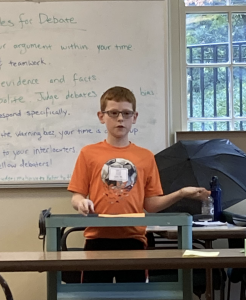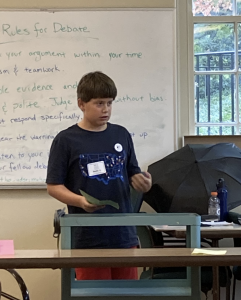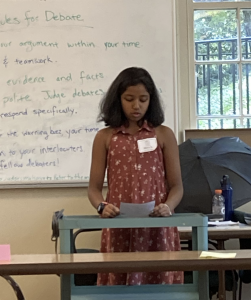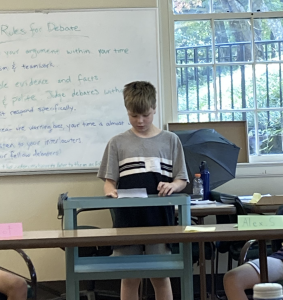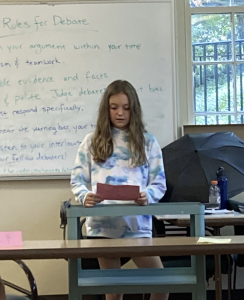Summer SAVY 2022/Session 6 – The Great Debate for Rising 5th/6th Grade
Friday:
Hello families and great debaters! Today was our final debate entitled The Great Debate: To Vend or Not To Vend. To prepare for this debate, we reviewed the things we’ve learned over the week about key debate strategies, we took notes on the specifics of the roles of each speaker, and began to research and prepare both our individual points and to discuss out strategies as teams. We had a very rigorous panel of judges who made excellent rubrics and evaluated individual arguments and the teams performances as a whole. Our teams did research with Ms. Patricia in order to find solid sources from reputable articles and studies, we fact checked, created hooks and introductory stories, branstormed rhetorical strategies, and made sure our arguments used the three appeals. And then the debate was on!
Our admin staff came to be a part of the audience and listen to our affirmative team take the position that SAVY students should be allowed to use vending machines against our opposition team who provided cogent arguments for why vending machine use would be a bad idea. After the formal portion of the debate, we had an open rebuttal and cross examination session.
Our six judges deliberated for a while on several points of evaluation including performance, the three appeals, professionalism, use of evidence, strength of argument, rebuttal, and persuasion. Both teams did so well that there was only a 4 point difference (out of more than 400 points!). Our teams were rockstars today and our moderators were like diplomatic leaders! I hope everyone learned a lot and had a good time!
Be warned parents! Your students are now great debaters and they may want to practice on you! I’d like to add a special thanks to the entire class for being so energetic and engaged, for being active listeners who were eager to learn the fundamentals of debate, and for participating so respectfully and diplomatically with their interlocutors! Perhaps next summer we can have The Great Debate Level 2!
Thursday:
Good evening families and great debaters! Today we started out our day by preparing our arguments for our mace/presentation debate. This style debate more closely resembles a persuasive appeal to the audience and the moderators and allows the students a chance to practice their individual skills in persuasive writing and persuasive delivery. Our teams all gave excellent reasons, evidence, and persuasive opening and closing statements. We also ran into the very common issue of having to learn how to get back on track when or if a debate gets slightly derailed by point of interest (POI) questions that become too specific and lead the debate off topic rather than clarify the issue. It turned out to be a good thing that this happened, although it can be frustrating, because it allowed us to go into more depth about the difference between a POI question, a rebuttal, an argument, and a question that ‘bogs down’ the debate by focusing on the wrong things. After lunch, each member of the class took an opposing position on an issue, and I had to flash debate the whole class one by one! This allowed us to get further practice in the art of a good rebuttal. Tonight, our students will be thinking about the final topic we chose for our formal Australasia debate tomorrow afternoon and will begin to prepare. Tomorrow’s debate will be our most formally structured yet and we will learn more about formal presentation, how to present and cite evidence, and how to use strategic rhetoric and language in order to persuade.
Wednesday:
Good Evening families and great debaters! Today we learned about a couple of different styles and structures of debate. We practiced evaluation by creating rubrics that we then used to evaluate examples of differently structured debates, some that were low-stakes and silly (should Phoebe get a cell phone?) and some that were on important public issues (should animal testing be allowed? Should college be free?). After each evaluation, we discussed what strategies the debaters could have used to strengthen their position and how those strategies could also be rebutted. We learned a little bit about the art of a good rebuttal and the three steps that every rebuttal should follow.
In the afternoon, we practiced rebuttals one on one with another student and a moderator on three different topics. In this exercise, students were given a total of five minutes for a flash affirmative debate. We presented our opening statement and three assertions. Our partners then practiced rebutting our arguments and the moderator provided feedback for how we could improve our rebuttals. Later we switched sides. Students had to practice a short, quick debate style that doesn’t allow for much preparation and requires students to think on their feet! As a class, we discussed what went well in our flash debates as well as how or why some of them became derailed.
Tomorrow we will practice two other forms of debate: mace/presentation style and parliamentary and we will select the topic for our final, formal class team debate on a higher stake topic that we will have on Friday.
Tuesday:
Good Evening families and great debaters! Today we made our way through our first team debate! In the morning we worked together to perfect our opening statements and construct our arguments. We learned more about ethos, logos, and pathos and how to use these three Aristotelian appeals both within our arguments and in our addresses to the debate moderators. We also learned about the importance of synthesis and cohesiveness in debate presentation as our different teams showed off their own unique styles and practiced transforming multiple evidentiary points into clean, concise, but poignant statements. We also discussed and then practiced the art of a good rebuttal, created rubrics for evaluating our debates, and learned a few new vocabulary words. In addition to logos, pathos, and ethos, you may want to ask your student about their interlocutors from today and whether or not your student felt that they had cogent arguments.
Tomorrow we will begin by reflecting and analyzing our debate and discussing ways we can strengthen our debating skills for next time. We will be introduced to Cicero’s five major rules of rhetoric as we learn about the many different kinds of debate – some of which we will practice in mini-flash debates in order to strengthen our reflexive thinking skills. We will also watch and evaluate several examples of middle school debates and write up “prescriptions” for improvement. As the week progresses, we will choose higher stakes topics and begin the challenge of arguing both the affirmative and opposing side of an issue.
Monday:
Good Evening families and great debaters! Today was our introduction to the ancient philosophical tradition that brings us the art of debate! In the morning session, we learned a bit about each other and discussed what we already know and want to learn about how to debate well. We also brainstormed together about what successful and unsuccessful practices of debate might look like and learned about different styles and structures of argumentation.
In the second part of the morning, we wrote a brief opinion piece on our introductory debate – a low stakes topic (Which makes the better pet? Cats or Dogs?) that will nonetheless let us get used to formulating arguments by using evidence, while also engaging rhetoric that appeals to logos, ethos, and pathos. We talked about how experience, storytelling, and our opinion pieces can provide us with an idea for a one sentence hook when we compare our thoughts to our teammates and notice common threads. These common threads indicate either common appeal or common aversion – information that will help us as we think about how we will use pathos.
Later, we broke into small groups to create informational posters detailing the facts, evidence, and kind of sources we might want to use to construct our arguments. We constructed the bones and framework of our arguments in our teams and then practiced fact checking and finding valid and trustworthy sources. In this exercise, we form the building blocks of an argument that uses logos and ethos.
At the end of the day, we began constructing our opening arguments! First we worked individually to get our ideas down, and then we brought all of them together in our small teams to decide how to incorporate them and create a powerful, convincing, concise opening statement. Tomorrow the debate is on!
